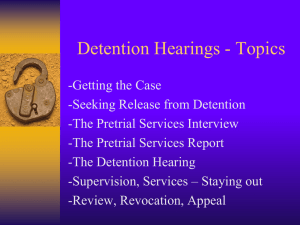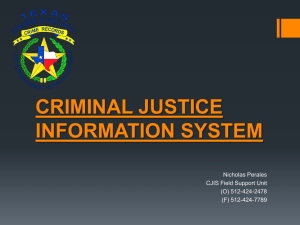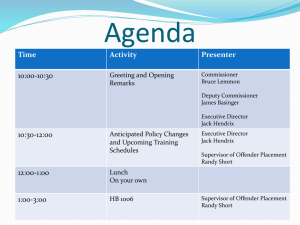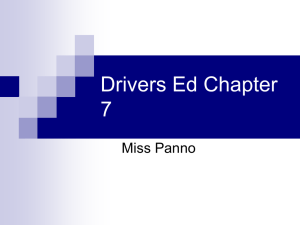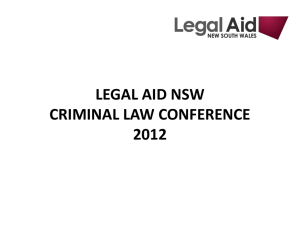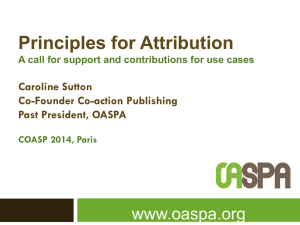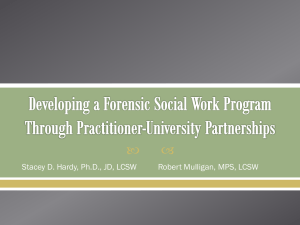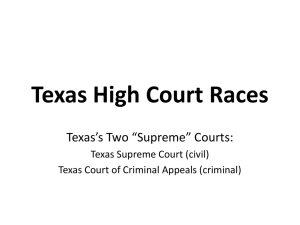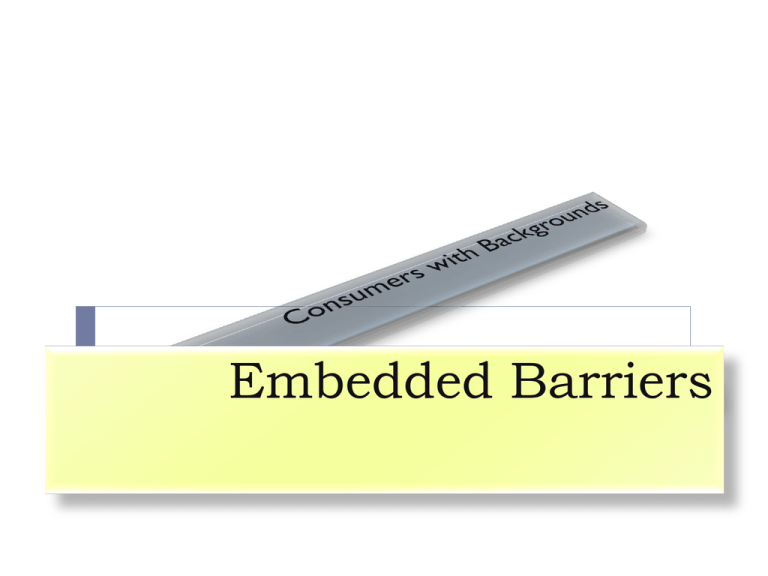
Embedded Barriers
Job Placement for Ex-offenders Training
Objectives
1. Identify suitable employment goals for people with
criminal background history.
2. How to develop employment resources for the people
with criminal background history.
What does consumer need?
ID
Social Security Card
Housing
Job
Transportation
Consumer A
Started attending ATI ($18,000.00 Debt)
HVAC training
BackOut of prison for 7 months
ground (Burglary, theft etc…)
Depression
4.3.2 Criminal Background Checks
4.3.2 Criminal Background Checks
(Added 06/08, Revised 12/09, 03/10, 02/11)
Some licensing entities (such as the Texas Board of Nursing) require a criminal background check
(CBC) before they will issue a license. Some training programs (for example, security guard
training) may also require a CBC before they will admit a person for training. If the consumer is
interested in an employment goal in one of these types of occupations, you should obtain a CBC
before completing the IPE.
DARS has been granted authority (Texas Government Code, Section 411.117 and Texas Human
Resources Code, Section 111.058) to obtain a CBC on consumers from the Texas Department of
Public Safety (DPS).
To request a CBC on a consumer, see the guidance document, Procedure for Requesting a Criminal
Background Check (CBC).
You should discuss the results of the CBC with the consumer. Provide a copy of the CBC to the
consumer if he or she makes a written request. For more information, see Business Procedures
Manual, Chapter 20: Confidentiality and Use of Consumer Records and Information,
20.8.3 Release of Consumer Criminal History Records Obtained from the Department of Public
Safety, and
20.10.4 Release of Information Contained in Criminal History Records.
Because CBC reports are critical to the decision-making process, they must be maintained as a
permanent part of a consumer’s case record, but should not be kept in the paper case file. In
accordance with your unit procedures, maintain CBCs in a separate confidential file where you can
access them as necessary. CBC reports are often incomplete and difficult to interpret. Consult
your supervisory chain, and Legal Services, if necessary, for assistance in interpreting them.
Department of Assistive and Rehabilitative Services
Planning &
Assessing
Authorization for Release of Confidential
Consumer Records and Information
With few exceptions, you are entitled, on request, to be informed about the information that DARS releases
and collects about you. You also are entitled to receive and review the information, and to have DARS correct
information about you that is incorrect. (Sections 552.021, 552.023, and 559.004 of the Government Code)
Consumer Name:
Social Security Number:
Birth Date:
Records or information to be released:
Release information or send records to (name and address):
Purpose for disclosure (specify reason, for example, consumer request, claim, litigation, application for
disability):
Purpose
The following considerations apply, to the extent that the provisions of the Health Insurance Portability and
Accountability Act (HIPAA) of 1996 and its regulations apply, to the release of any protected health information
included in the information above.
Acknowledgment of Notices: I acknowledge that DARS has provided me a copy of this authorization and
has notified me that:
I may refuse to sign this authorization, and my refusal to sign it will not affect my receiving services from
DARS;
Any information obtained from another agency or organization may be released only by or under the
conditions established by that agency or organization; and
If DARS releases my protected health information, some or all of this information may be redisclosed. If
redisclosed, this information may no longer be protected from further disclosure by law, particularly by the
Privacy Rule of the Health Insurance Portability and Accountability Act (HIPAA) of 1996.
Period of Validity of Authorization: I understand that I may revoke this release in writing at any time after
signing it, except that any revocation does not affect an action taken based on this release. Until revoked by
me, this release remains valid either for a period of 180 days from the date signed, or until the date when I
cease to be a DARS applicant or consumer, whichever date occurs earlier.
I, on behalf of myself or any other person or entity who may have an interest in the matter, hereby release
DARS, and any person or organization requesting information from DARS, from all legal responsibility and
liability that might arise from this disclosure of personal information based upon this signed release.
Miscellaneous: I further authorize DARS and those disclosing my protected health care information and
personal information under this authorization to exchange this information electronically (for example, by email
or fax). A photocopy of this authorization is fully acceptable as an original.
Signature of Consumer or
Representative:
Representative Printed Name
(if applicable):
Date:
X
This permission to release information complies with the Drug Abuse Prevention, Treatment and Rehabilitation Act,
as amended, 42 U.S.C. Sec. 290ee-3 (290dd-2), the Comprehensive Alcohol Abuse and Alcoholism Prevention,
Treatment, and Rehabilitation Act of 1970, as amended, 42 U.S.C. Sec. 290dd-3 (290dd-2), and 42 CFR Part 2.
Criminal History Evaluation Letter
Determination of Eligibility Request
Criminal History Questionnaire
Determination of Eligibility
If you want to find out if your DRS consumer can obtain an occupational license in the State of Texas, you
can go through the following procedures to find out if your consumer would be granted a license before
he/she enters training for that occupation or starts looking for work in that occupation; for example,
cosmetologist or barber.
Steps:
VRC counsels with the consumer that you may or may not be able to support the consumer with his/her chosen occupation or training for
that certain occupation that requires a license in the State of Texas. You will need to do a criminal background check (CBC) on the
consumer. If the consumer wants a copy of the CBC, the consumer will need to sign the release form (RPM 4.3.2).
Go to your Unit MSS and request a criminal background check on your consumer.
MSS gives the consumer’s CBC to the VRC to view. Only approved staff can view CBCs. Are you an approved staff? Ask the MSS?
VRC counsels with the consumer about his/her CBC only if the consumer signed the DARS 1517-2 form.
VRC with the assistance of the consumer completes the “CRIMINAL HISTORY QUESTIONNAIRE” form (see attachment).
VRC generates a purchase order to TDLR for $25 fee (see below for instructions on how to issue the PO).
TDLR will mail a letter to the VRC stating if the consumer is eligible to be granted a State of Texas license for that occupation.
VRC counsels with the consumer the results of the letter. If the letter states that the consumer would be granted a Texas license in that
occupation then the VRC can proceed with determining if DRS will sponsor the consumer with training in that occupation and job
placement assistance in that occupation. However, if the letter states that the State of Texas will not grant the consumer a license in
that occupation then the VRC should not sponsor the consumer in training or employment assistance pertaining to that
occupation. The VRC can only consult with his/her mentor or the Area Manager before counseling with the consumer regarding denial
of VR services that occupation the consumer wants a license in. The VRC must always remember to use “Best Business Practice” and
“Ethics”. Also, the VRC is a good steward of “public funds” (RPM Chapter 1) when making decides to sponsor or not to sponsor and
use VR services/funds for a consumer in a pertain occupation.
Texas Department of Licensing and Regulation
Vendor # 3-452452452-6002
Cost $25
ReHabWorks – Service Record Code Description 94101
Level 1 = Testing, Licenses, Certifications, Board Exams and Related Fees and Services - MC [94101]
94101-97342
Level 2 = Testing, License, Certification, Board Examination or Other Related Fees [94101-97342]
Purchase order put into the COMMENT Box - “Determination of Eligibility Request – Criminal
History Evaluation” if the DRS consumer can obtain a Texas license.
Purchase order punt into the COMMENT BOX – “Interagency Voucher Code: RTI 1930”.
(RTI = recurring transaction index)
The fee cost $25 per request.
http://www.license.state.tx.us/crimHistoryEval.htm#requestForms
HEALTH CARE FACILITIES
Sec. 250.006. CONVICTIONS BARRING EMPLOYMENT. (a) A person for whom the facility or the individual employer is entitled to obtain criminal history record
information may not be employed in a facility or by an individual employer if the person has been convicted of an offense listed in this subsection:
(1) an offense under Chapter 19, Penal Code (criminal homicide);
(2) an offense under Chapter 20, Penal Code (kidnapping and unlawful restraint);
(3) an offense under Section 21.02, Penal Code (continuous sexual abuse of young child or children), or Section 21.11, Penal Code (indecency with a child);
(4) an offense under Section 22.011, Penal Code (sexual assault);
(5) an offense under Section 22.02, Penal Code (aggravated assault);
(6) an offense under Section 22.04, Penal Code (injury to a child, elderly individual, or disabled individual);
(7) an offense under Section 22.041, Penal Code (abandoning or endangering child);
(8) an offense under Section 22.08, Penal Code (aiding suicide);
(9) an offense under Section 25.031, Penal Code (agreement to abduct from custody);
(10) an offense under Section 25.08, Penal Code (sale or purchase of a child);
(11) an offense under Section 28.02, Penal Code (arson);
(12) an offense under Section 29.02, Penal Code (robbery);
(13) an offense under Section 29.03, Penal Code (aggravated robbery);
(14) an offense under Section 21.08, Penal Code (indecent exposure);
(15) an offense under Section 21.12, Penal Code (improper relationship between educator and student);
(16) an offense under Section 21.15, Penal Code (improper photography or visual recording);
(17) an offense under Section 22.05, Penal Code (deadly conduct);
(18) an offense under Section 22.021, Penal Code (aggravated sexual assault);
(19) an offense under Section 22.07, Penal Code (terroristic threat);
(20) an offense under Section 33.021, Penal Code (online solicitation of a minor);
(21) an offense under Section 34.02, Penal Code (money laundering);
(22) an offense under Section 35A.02, Penal Code (Medicaid fraud);
(23) an offense under Section 36.06, Penal Code (obstruction or retaliation);
(24) an offense under Section 42.09, Penal Code (cruelty to livestock animals), or under Section 42.092, Penal Code (cruelty to nonlivestock animals); or
Prohibited Backgrounds cont.
(25)
a conviction under the laws of another state, federal law, or the Uniform Code of Military Justice for an offense
containing elements that are substantially similar to the elements of an offense listed by this subsection.
(b) A person may not be employed in a position the duties of which involve direct contact with a consumer in a facility or
may not be employed by an individual employer before the fifth anniversary of the date the person is convicted of:
(1) an offense under Section 22.01, Penal Code (assault), that is punishable as a Class A misdemeanor or as a felony;
(2) an offense under Section 30.02, Penal Code (burglary);
(3) an offense under Chapter 31, Penal Code (theft), that is punishable as a felony;
(4) an offense under Section 32.45, Penal Code (misapplication of fiduciary property or property of a financial institution),
that is punishable as a Class A misdemeanor or a felony;
(5) an offense under Section 32.46, Penal Code (securing execution of a document by deception), that is punishable as a
Class A misdemeanor or a felony;
(6) an offense under Section 37.12, Penal Code (false identification as peace officer); or
(7) an offense under Section 42.01(a)(7), (8), or (9), Penal Code (disorderly conduct).
(c) In addition to the prohibitions on employment prescribed by Subsections (a) and (b), a person for whom a facility
licensed under Chapter 242 or 247 is entitled to obtain criminal history record information may not be employed in a facility
licensed under Chapter 242 or 247 if the person has been convicted:
(1) of an offense under Section 30.02, Penal Code (burglary); or
(2) under the laws of another state, federal law, or the Uniform Code of Military Justice for an offense containing
elements that are substantially similar to the elements of an offense under Section 30.02, Penal Code.
(d) For purposes of this section, a person who is placed on deferred adjudication community supervision for an offense listed
in this section, successfully completes the period of deferred adjudication community supervision, and receives a dismissal and
discharge in accordance with Section 5(c), Article 42.12, Code of Criminal Procedure, is not considered convicted of the
offense for which the person received deferred adjudication community supervision.
LCDC
Sec. 504.1525. CERTAIN GROUNDS FOR LICENSE, REGISTRATION, OR CERTIFICATION REFUSAL;
EXCEPTION. (a) Except as provided by Subsection (b), the department may not issue a license,
registration, or certification under this chapter to an applicant who has been:
(1) convicted or placed on community supervision during the five years preceding the date of application in
any jurisdiction for an offense equal to a Class B misdemeanor specified by executive commissioner rule;
(2) convicted or placed on community supervision in any jurisdiction for an offense equal to or greater
than a Class A misdemeanor specified by executive commissioner rule; or
(3) found to be incapacitated by a court on the basis of a mental defect or disease.
(b) The department may issue a license to a person convicted or placed on community supervision in any
jurisdiction for a drug or alcohol offense described by Subsection (a)(1) or (2) if the department
determines that the applicant has successfully completed participation in an approved peer assistance
program.
(c) Subsection (a) does not apply to an applicant who has, with respect to Subsection (a)(1) or (2), received
a full pardon based on the person's wrongful conviction or, with respect to Subsection (a)(3), been found by
a court to no longer be incapacitated.
Sex Offender Registry
https://records.txdps.state.tx.us/DPS_WEB/SorNew/index.aspx
https://records.txdps.state.tx.us/DPS_WEB/SorNew/index.aspx
Texas Department of Correction
http://offender.tdcj.state.tx.us/POSdb2/index.jsp
Dallas County Criminal Background
http://www.dallascounty.org/criminalBackgroundSearch
Letter of Explanation or Impact Statement
The person with the
criminal background history
need to prepare
himself/herself for the job
interview and how to
explain his/her convictions
in a short statement and
what he/she is now doing
with his/her life in a positive
manner.
Example:
Yes, I was convicted of
DWIs in California over
seven years ago, but since
then I have been sober for
several years now. I have
been putting my life in order
by trying to find a job by
going to the Workforce
Center.
Example – Impact Statement
I understand that you have questions about my
background. I assure you that I have learned from my
mistakes and have corrected past problems. I have
spent time training for this career path because I am
more mature now and have a solid plan for my future.
If given the chance, I will give your company 100
percent effort. I will be at work early, and even stay late
if necessary. I know you will not be disappointed if you
hire me.
Occupations
Person with criminal background history may be limited in
the type of occupations that he/she can be trained in or
apply for that type of occupation depending on the type of
convictions.
1.
2.
3.
4.
Person needs to obtain a copy of his/her criminal background
history to find out what types of convictions he/she has and if it is
correct information.
What are the person’s transferrable skills?
Can the person’s transferrable skills go into another occupation?
If the person is on probation, what are his/her work restrictions?
Resource
Texas Workforce Commission
Workforce Centers
www.twc.state.tx.us
www.workintexas.com
Free training, free resume writing
classes, job search classes, etc.
RESOURCE
The U.S. Department of Labor (DOL) Employment and Training
Administration (ETA) has on-line employment support of for
ex-offenders. Their website offers information, tips, and
resources to help people with criminal convictions overcome
barriers they might face in their job search. There is also a
wealth of information for counselors and others who work with
individuals with criminal records.
Through this website, you can find:
State Resources – for help with basic needs or getting ready for job search
Explore Careers – to learn more about work options
Get Training – to improve skills or go back to school
Find a Job – to search for and apply for jobs
To access the Career One-Stop Ex-offender website, go to:
http://www.careeronestop.org/ExOffender/index.aspx


